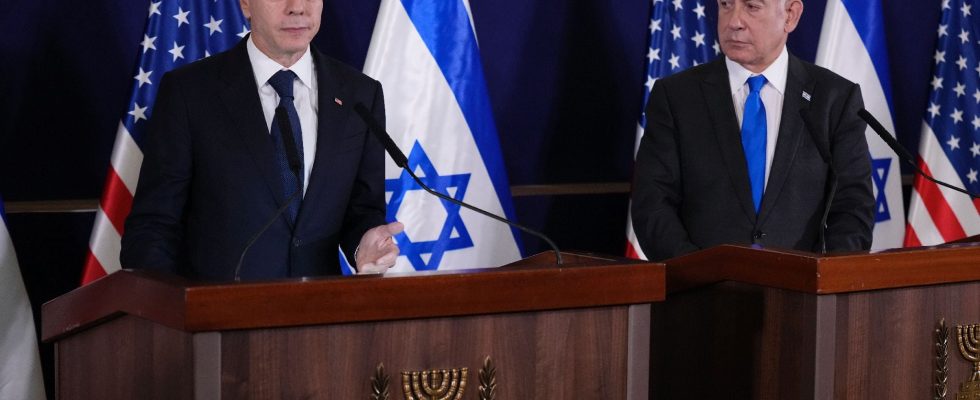Fears of seeing the war between Israel and Hamas ignite the entire Middle East have increased since the strike attributed to Israel which killed Hamas number 2, Saleh al-Arouri, on Tuesday, in the suburbs of Beirut, and a double explosion which left 95 dead on Wednesday January 3 in Iran, the deadliest in almost forty years. In this context, American diplomats are trying to avoid greater tensions with Lebanon and Iran, and the extension of the conflict.
Information to remember:
⇒ Anthony Blinken flies to the Middle East on Thursday
⇒ Iran accuses the United States and Israel of being behind the attacks in Kerman, which left 95 dead
⇒ New bombings took place in parallel in Gaza during the night from Wednesday to Thursday
Anthony Blinken on diplomatic tour Thursday
The head of American diplomacy Antony Blinken embarks this Thursday on a new tour of the Middle East in the hope of avoiding an expansion of the war in Gaza. A stage is notably planned on Israeli soil. No country has “an interest in escalation,” declared Matthew Miller, the spokesperson for American diplomacy.
Fears of seeing the Israel/Hamas war ignite the entire Middle East have increased since the fatal strike on Hamas number 2, Saleh al-Arouri, on Tuesday, in the suburbs of Beirut, and a double explosion which left 95 dead Wednesday in Iran. The Supreme Leader of the Islamic Revolution, Ayatollah Ali Khamenei, promised “a severe response” to the explosions.
Hezbollah warns Israel
The leader of Hezbollah, Hassan Nasrallah, for his part warned Israel against a new escalation: “For the moment, we are fighting on the front in a calculated manner. […] but if the enemy thinks of launching a war against Lebanon, we will fight without limits, without restrictions and without borders […] We do not fear war,” said Hassan Nasrallah.
In Israel, army chief of staff Herzi Halevi said his troops were on alert on the border with Lebanon, citing “opportunities” to “create significant change” in the region. This strike, attributed by Hamas and Hezbollah to Israel, has not been claimed so far but an American official requesting anonymity indicated that it was indeed “Israeli”.
Tensions are therefore increasing on the Israeli-Lebanese border, in Syria and Iraq, where American bases are targeted, but also in the Red Sea, where the Houthi rebels of Yemen are carrying out attacks to slow down global maritime traffic. A coalition led by the United States on Wednesday urged the Houthis to stop “immediately their illegal attacks” otherwise they will face the “consequences”.
Iran accuses Israel and the United States of being behind the Kerman attack
After the attacks in Kerman on the sidelines of the commemorations of the death of General Qassem Soleimani, architect of Iranian military operations in the Middle East, Tehran accused Israel and the United States of being behind the attack, which killed at least 95 dead according to an updated report. “The responsibility for this crime lies with the American and Zionist regimes, and terrorism is only a tool,” wrote the Iranian president’s political advisor, Mohammad Jamshidi, on X.
Accusations rejected by Washington: the State Department deemed any suggestion of the involvement of the United States or Israel “absurd”. “The United States was not involved in any way,” State Department spokesman Matthew Miller said, adding: “We have no reason to believe Israel is involved.” The attack “looks like a terrorist attack, the kind of thing ISIS has done in the past,” said a senior US official, speaking on condition of anonymity.
Iran’s sworn enemy, Israel, has not commented on the attack. “We are focused on fighting with Hamas,” army spokesman Daniel Hagari said. Iran’s supreme leader, Ayatollah Ali Khamenei, for his part promised a “severe response” to the attack, an act also described as “odious and cowardly” by Iranian President Ebrahim Raïssi.
For his part, Russian President Vladimir Putin denounced an attack “shocking in its cruelty and cynicism”, and the Secretary General of the UN, the European Union, France, Germany, Jordan and Saudi Saudi Arabia also condemned the attack.
New bombings on Gaza
In the Gaza Strip, the Israeli army continued its air raids during the night from Wednesday to Thursday, notably in Khan Younes (south) and Deir al-Balah (center), where the Hamas Ministry of Health reported of several deaths. In addition to airstrikes and ground fighting, Gazans face severe shortages of food, water, fuel and medicine as humanitarian aid trickles in despite a UN resolution.
